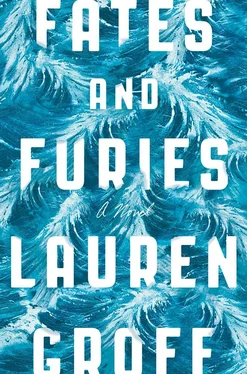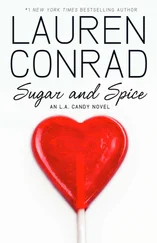—
“I AM NOTHING,” Alice said, after Gertrude died, “but a memory of her.”
—
AFTER MATHILDE flipped the Mercedes, the policeman came. She opened her lips and let the blood run out, for the sake of drama.
The flashing blues and reds made him look ill, then well, then ill again. She saw herself as if his face were a mirror. She was pale and skinny with a shorn head, with a chin full of blood, blood down her neck, blood on her hands and down her arms.
She held up her palms, which she’d cut on the barbed-wire fence, climbing over it to the road.
“Stigmata,” she said as tonguelessly as possible, and laughed.
SHE HAD ALMOST DONE the right thing. At first, that bright April morning after Hamlet at Vassar, after the full and heady flight into Lotto, the love in her blood already humming like a beehive.
She’d woken to the flick of dark when the path lights out the window extinguished themselves. Her clothes still on, no telltale soreness below. Her promise to Ariel kept, then; she hadn’t had sex with Lotto. She’d broken no commitments. She’d only slept beside this charming boy. She looked below the sheet. He was naked. And how.
Lotto’s fists were balled up beneath his chin, and even in sleep, absent that waking wit, he was plain. The scarred skin on the cheeks. The hair still thick and swirling around his ears, the lashes, that carved jaw. She had never in her life met such an innocent. In nearly everyone who had ever lived there was at least one small splinter of evil. There was none in him: she knew it when she saw him up on that windowsill the night before, the lightning shocking the world behind him. His eagerness, his deep kindness, these were the benefits of his privilege. This peaceful sleep of being born male and rich and white and American and at this prosperous time, when the wars that were happening were far from home. This boy, told from the first moment he was born that he could do what he wanted. All he needed was to try. Mess up over and over, and everyone would wait until he got it right.
She should be resentful. But she could not find resentment toward him anywhere inside her. She wanted to press herself against him until his beautiful innocence had stamped itself on her.
In her ear, the voice she tried to block out all these years told her sternly to go. To not inflict herself on him. She had never been made to be obedient, but she thought of him waking to find her there, how irreparable the damage would be, and she obeyed; she dressed and fled.
She pulled the collar of her jacket over her cheeks so nobody would see her distress even though it was still dark outside.
There was a diner in town, deep into the grayer, less gleaming streets, a place most Vassar students would never go near. This is why she loved it. Also: the grease and smell and the homicidal cook who smashed the hash browns like he hated them and the waitress who seemed to be neurologically lopsided, her ponytail pulled unintentionally toward an ear, an eye floating off toward the ceiling as she took the order. On one hand, her nails were long; on the other, they were short and polished red.
Mathilde took her usual booth and hid her face behind the menu and let her smile fall off her face, and the waitress didn’t say a word, just put the black coffee and rye toast and a small linen handkerchief with blue embroidery before Mathilde, as if she knew that tears would come. Well. Perhaps they would, though Mathilde hadn’t cried since she was Aurélie. One side of the waitress’s face winked and she went back to the radio that was fuzzily playing some shock jock, all brimstone and perdition.
Mathilde knew how her life would go if she let it. Already, she knew that she and Lotto would be married if she seeded the thought in his brain. The question was if she could let him off the hook. Practically anyone would be better for him than she would be.
She watched the waitress swaying behind the homicidal cook to grab a mug from the rack under the counter. She saw how she put her hands on his hips, how he bumped back against her with his rear, a little slapstick in-joke, kiss of hips.
Mathilde let the coffee and the toast go cold. She paid, tipped far too much. And then she stood and walked into town, and stopped at the Caffè Aurora for cannoli and coffee, and was at Lotto’s room with two aspirin and a glass of water and the food when his eyelashes gave a little flutter and he looked up from whatever dream — unicorns, leprechauns, merry forest bacchanals — to see her sitting beside him.
“Oh,” he said. “I thought you couldn’t be real. I thought you were the best dream I ever had.”
“No dream,” she said. “I’m real. I’m here.”
He put her hand on his cheek and rested there against her. “I think I’m dying,” he whispered.
“You’re severely hungover. And we’re born dying,” she said, and he laughed, and she held his warm, rough cheek, having committed to him in perpetuity.
She shouldn’t have. She knew it. But her love for him was new, and her love for herself was old, and she was all she’d had for so very, very long. She was weary of facing the world alone. He had presented himself at the exact right time, her lifeline, although it would be better for him if he had married the kind of soft, godly woman she’d know soon enough his own mother wanted for him. That Bridget girl would have made everyone happy. Mathilde was neither soft nor godly. But she made a promise that he would never know the scope of her darkness, that she would never show him the evil that lived in her, that he would know of her only a great love and light. And she wanted to believe that their whole life together he did.
—
“MAYBE, AFTER GRADUATION, we could go visit Florida,” Lotto said, into the back of her neck.
This was just after they were married. Days, maybe. She thought of Lotto’s mother on the telephone, the bribe Antoinette had dangled. A million dollars. Please. For a moment, she considered telling him all about the call, then thought of how he’d be wounded, and knew she couldn’t. She’d protect him. Better for him to believe his mother punitive than just plain cruel. Mathilde’s apartment above the mission-style antique shop was bizarrely elongated in the streetlight filtering up. “I haven’t been home since I was fifteen. I want to show you off. I want to show you all the places I juvenile delinquented,” he said, his voice deepening.
“That’s not a word,” she murmured. And she kissed him so long, she made him forget.
Then: “Baby,” he said, cleaning up with his bare foot and a paper towel a glass of water he’d spilled on the oak floor in their new, sub-rosa apartment in Greenwich Village, gleaming as it was, still sans furniture. “I was thinking that maybe we could take a weekend and visit Sallie and my mom on the beach. I’d love to see your bod kicking it with tan lines.”
“Definitely,” Mathilde said. “But let’s wait until you get your first big role. You want to come back the conquering hero. Besides, thanks to your mother, we don’t have any money.” When he looked doubtful, she stepped closer, slid her hand down the waistband of his jeans, and whispered, “If you come back with a role under your belt, you can return the cock of the walk.” He looked down at her. He crowed.
Then: “I think I have seasonal affective disorder,” he groused, watching sleet turn the street pewter, shivering from the draft coming from the windows that touched the sidewalk. “Let’s go home for Christmas and get a little sun.”
“Oh, Lotto,” Mathilde said. “With what? I just bought our weekly groceries with thirty-three dollars and a handful of quarters.” Her eyes went damp with frustration.
Читать дальше












